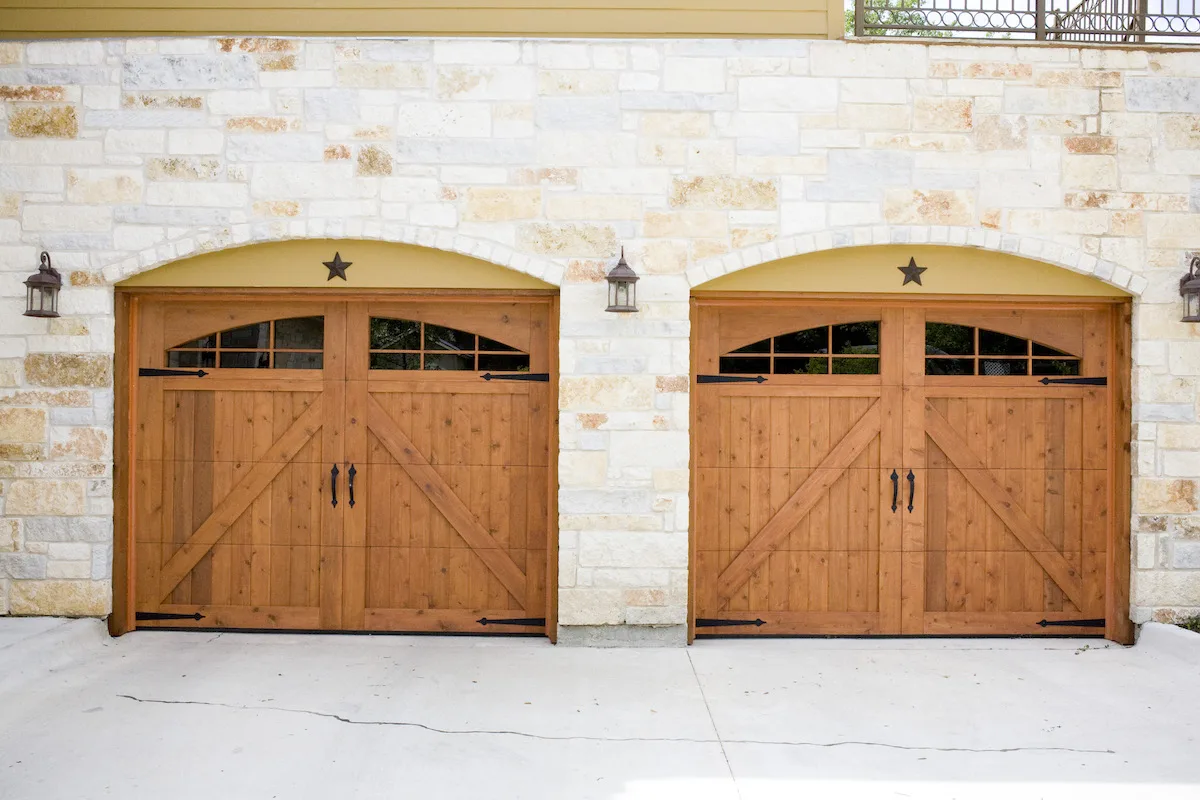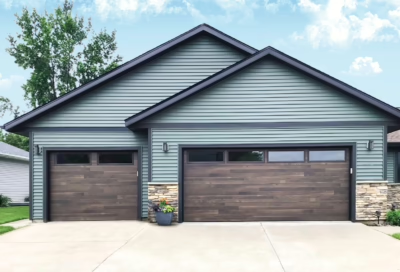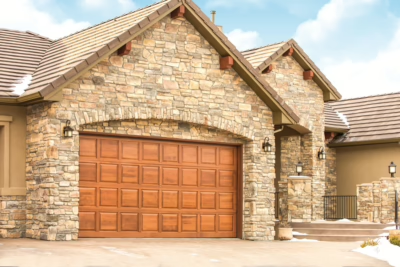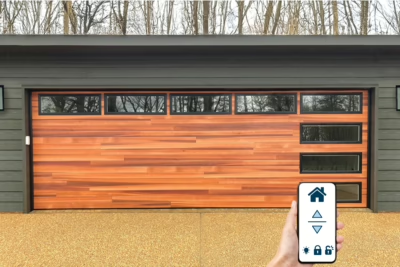Choosing a garage door is about more than curb appeal — it’s about durability, maintenance, energy efficiency, and long-term value. Two of the most popular materials on the market are steel and wood, each offering distinct advantages and drawbacks depending on your environment, budget, and aesthetic goals.
In this guide, we’ll break down the key differences between steel and wood garage doors to help you make an informed, confident decision for your facility or home.
Aesthetics & Curb Appeal
Wood Garage Doors: Classic and Customizable
There’s no denying the natural beauty of wood. Wood garage doors offer a warm, traditional, and upscale look that’s hard to replicate.
Pros:
- Rich, natural grain for premium appearance
- Can be stained or painted any color
- Easily customized with panels, windows, or decorative hardware
Cons:
- Wood can fade, warp, or crack over time if not properly maintained
- Wood styles are often more traditional — not always ideal for ultra-modern architecture
Wood is ideal for homes or facilities that prioritize design harmony or historic aesthetics.
Steel Garage Doors: Sleek and Versatile
Steel doors come in a wide range of styles and finishes, including wood-look options that closely mimic real grain textures.
Pros:
- Available in multiple panel designs and finishes (smooth, embossed, woodgrain, etc.)
- Compatible with both traditional and contemporary architecture
- Typically available in more budget tiers and product lines
Cons:
- May lack the authentic look and feel of real wood
- Dents and scratches may be more noticeable
Steel doors are perfect for those seeking a clean, modern, or low-maintenance exterior.
Durability & Lifespan
Steel: Tough Against Impact
Steel garage doors are engineered for strength and resistance. They’re a go-to option for high-use environments and facilities that require low upkeep.
Pros:
- Excellent resistance to dents (especially in higher-gauge doors)
- Fire-resistant and pest-resistant
- Longer overall lifespan with minimal maintenance
Cons:
- Susceptible to rust if scratched or in coastal climates without protective coatings
Wood: Strong but Susceptible
Wood is naturally strong, but it’s also vulnerable to environmental factors — especially moisture, temperature changes, and insects.
Pros:
- Heavy and solid; holds up well to moderate use
- Can be repaired or refinished if scratched or worn
Cons:
- Prone to rotting, warping, or insect damage over time
- Requires consistent maintenance to maintain integrity
In terms of raw toughness, steel has the edge — especially for commercial or high-traffic applications.
Maintenance & Upkeep
Wood Requires Commitment
Wood garage doors need consistent upkeep to preserve their appearance and structural integrity.
Typical maintenance includes:
- Annual sanding, painting, or staining
- Checking for rot, insect damage, or moisture penetration
- Adjusting or replacing cracked panels
Who it’s for: Property owners who value appearance and don’t mind seasonal maintenance.
Steel is Low-Maintenance
Steel garage doors are among the easiest to maintain — one of the reasons they’re so widely used in both residential and commercial applications.
Maintenance requirements:
- Occasional cleaning with soap and water
- Lubrication of moving parts
- Touch-up paint for deep scratches (if necessary)
Who it’s for: Owners looking for reliability with minimal long-term maintenance costs.
Insulation & Energy Efficiency
Garage door insulation affects both comfort and utility bills — especially in attached garages or facilities that store temperature-sensitive items.
Insulated Steel Doors Perform Best
Most steel doors are available in insulated models using polystyrene or polyurethane cores.
Advances:
- Superior thermal efficiency (especially with polyurethane)
- Helps maintain interior temperatures year-round
- Reduces outside noise
Wood Doors Offer Natural Insulation — to a Point
Wood is a naturally insulating material, but it doesn’t compare to modern foam-core insulation in steel doors.
Considerations:
- Custom wood doors can be built with insulated cores, but this increases cost
- Without insulation, wood doors may allow temperature fluctuations
If energy efficiency is a top concern, insulated steel doors typically provide the best performance.
Cost Comparison
Steel Doors: Budget-Friendly Options Available
Steel doors are available at a wide range of price points, depending on gauge, insulation, design, and features.
Average price range:
$800 – $3,000+
Basic non-insulated steel doors are highly affordable, while premium insulated or faux-wood finishes can raise the cost.
Wood Doors: A Premium Investment
Wood garage doors tend to be more expensive upfront — especially if custom-built or hand-crafted.
Average price range:
$1,500 – $6,000+
Maintenance and refinishing costs should also be factored into long-term ownership.
Weather Resistance
Steel: Good All-Around Protection
Steel handles rain, wind, snow, and sun exposure well — especially with a corrosion-resistant finish or powder coating.
Best for: All climates, especially when rust-resistant materials are used
Wood: Needs Protection in Harsh Conditions
Wood can be vulnerable in humid or wet climates unless it’s properly sealed and maintained.
Best for: Mild, dry environments or protected installations
Customization Options
Both steel and wood garage doors offer customization, but the level of detail and flexibility varies.
Wood doors:
- Fully custom designs available
- Unlimited stain and paint options
- Carriage house and panel stylese.
Wood doors:
- Many pre-designed styles available
- Faux-wood finishes for a natural look without the maintenance
- Window inserts and decorative hardware optional
If you want a truly one-of-a-kind door, wood gives you unmatched creative freedom. For affordable variety, steel provides plenty of options.
Summary Table: Steel vs. Wood Garage Doors
Feature
Steel Garage Doors
Wood Garage Doors
Appearance
Modern, clean, versatile
Warm, traditional, customizable
Durability
Highly durable, rust-resistant
Strong but susceptible to wear
Maintenance
Low-maintenance
High-maintenance
Energy Efficiency
Excellent with insulation
Moderate
Weather Resistance
Great with protective coating
Requires sealing, vulnerable
Cost Range
$800 – $3,000+
$1,500 – $6,000+
Best For
High-traffic, commercial, residential
Custom design, aesthetic appeal
Final Thoughts
Choosing between a steel and wood garage door comes down to your priorities. If you’re focused on durability, efficiency, and low maintenance, steel is a strong contender. If aesthetics and timeless design are your top concerns — and you don’t mind the upkeep — wood may be worth the investment.
At DuraServ, we offer a full range of garage doors in both materials, including insulated options, faux-wood steel styles, and custom wood builds. Our team can help you compare models and choose the perfect solution for your property.



